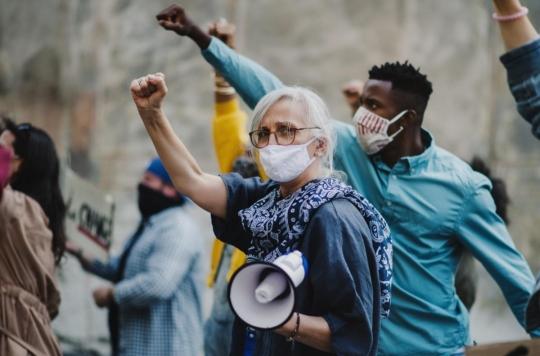The psychological consequences of the pandemic on individuals have an impact on their perception of the state and the political system in general.

- In 2020, there were nearly 22,000 protests in the United States.
- Worldwide, they increased by 7% on average compared to 2019.
The coronovirus pandemic is disrupting our habits, challenging our health systems and forcing economies to adapt. According to a study published in Psychological Science, it also calls into question the relationship between citizens and the state. Their work was carried out through questionnaires, sent to the inhabitants of different countries including Hungary, the United States, Italy and Denmark. In total, they interviewed more than 6,000 adults.
When psychology and politics are linked
“The pandemic has disrupted our way of life, which has generated frustrations, unprecedented social exclusion, and a multitude of other problems, emphasizes Henrikas Bartusevičius, lead author of this study. Our research shows that the psychological cost associated with living in times of pandemic has also fueled anti-government and anti-system attitudes, leading to political violence in many countries.“To reach this conclusion, the researcher and his team asked the participants questions about the consequences of the pandemic on their health, their finances, their social relations but also on their rights. They had to say if they felt any discomfort. dissatisfaction with their government, whether they were thinking of engaging in protests or even political violence or had done so.According to others in the research, the weight or the psychological cost of the virus can be defined by all the stress experienced by individuals during this period, whether it is the fear of the disease, social restriction measures, wearing a mask, etc.
A tendency to violence
“The results of this survey reveal striking associations between the psychological weight of Covid-19 and highly disruptive behaviors, including the use of violence for political purposes.“, underline the authors of the research. On the other hand, they observed no link between Covid-19 and the desire to engage in peaceful forms of activism. Depending on the country, the results vary: Hungarians felt a higher psychological cost of Covid-19, while it was low for the Danes, yet the latter were the most vigorous in their anti-system attitudes and their desire for political violence.
What are the causes ?
According to the team of researchers, this link between the pandemic and political violence could be partly explained by the consequences of the virus on societies. “The pandemic and lockdowns have unevenly affected different social groups, which has generated feelings of injustice and anger, potentially directed against governments“, emphasize the authors. Social exclusion and the marginalization of certain groups have also been reinforced, which may have amplified anti-system behaviors. For the authors of this study, when the pandemic is over and the time is at reconstruction, it is essential that measures be taken to restore correct relations between citizens and the State, as well as to restore the economic system and health.

.















